In English
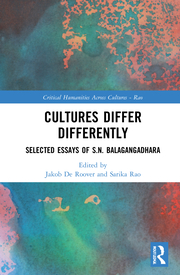
Cultures Differ Differently: Selected Essays of S.N. Balagangadhara
Edited by Jakob De Roover and Sarika Rao, 2022
This volume brings together a collection of new and previously published essays by S.N. Balagangadhara, which develop an alternative theoretical framework for a comparative study of Western and Asian cultures. These essays illustrate how ‘decolonisation of social sciences’ is a cognitive task and offer novel hypotheses about human beings and society. They demonstrate the implications of cultural difference in the study of domains such as psychology, political theory, ethics, religion, translation, law, Indology, and philosophy. (Click here for the South Asia edition of the book.)
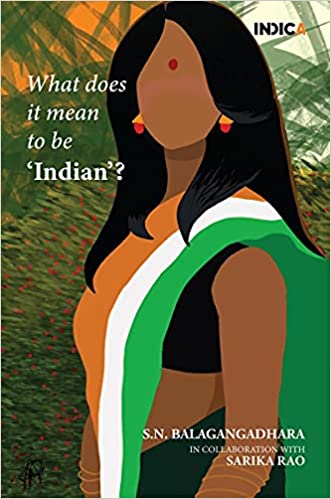
What does it mean to be ‘Indian’?
S.N. Balagangadhara in collaboration with Sarika Rao, 2021
Why ask this question today? After all, a lot is written about India, her culture, her past, her society, the psychology and sociology of individuals and groups. Why is that not enough? It is because what we have learnt so far is either false or fragmentary. If Indian culture is not a slightly inferior, slightly idiosyncratic variant of Western culture, as the received view has it for a very long time, what else is it? Research into culture and cultural differences gives novel and surprising answers. Written for an intelligent but lay public, this book shares the results of 40 years of scientific investigations in the research programme Comparative Science of Cultures. It transcends the political distinction between ‘the right’ and ‘the left’ by looking deeper into ideas on human beings, society, culture, experience, the past, impact of colonialism etc. Today, the question ‘What does it mean to be ‘Indian’?’ is both important and difficult to answer. Is there something ‘Indian’ about this culture that goes beyond the differences between Hindus, Muslims, Christians, Sikhs or Jains? What does it überhaupt mean to belong to Indian culture?

The Heathen in his Blindness: Asia, the West and the Dynamics of Religion
S.N. Balagangadhara, 1994 (2nd. ed. 2005)
Today, most intellectuals agree that (a) Christianity has profoundly influenced Western culture; (b) members from different cultures experience many aspects of the world differently; (c) the empirical and theoretical study of both culture and religion emerged within the West. This book argues that these truisms have implications for the conceptualization of religion and culture. More specifically, the thesis is that non-Western cultures and religions differ from the descriptions prevalent in the West, and it is also explained why this has been the case. Religion is important to the West because the constitution and identity of Western culture are tied to the dynamic of Christianity as a religion.

Reconceptualizing India Studies
S.N. Balagangadhara, 2012
This book asserts that postcolonial studies and modern India studies are in need of theoretical rejuvenation. Post Said’s Orientalism, postcolonialism, as a discipline, has drifted into the realm of paralysing self-reflection and impenetrable jargon. This volume addresses the original concerns of postcolonial studies and the central problems of modern India studies, and points out a potential direction for the social-scientific study of the Indian culture at a time when it is being challenged from all sides.
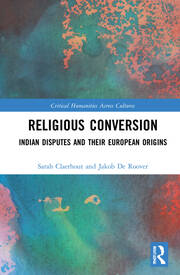
Religious Conversion: Indian Disputes and Their European Origins
Sarah Claerhout and Jakob De Roover, 2022
Since 1947, the issue of conversion has given rise to increasingly intense disputes in India, without any solution in sight. This book starts from the impression that ‘conversion’ is experienced very differently by the antagonists. They seem blind to each other’s concerns and deaf to each other’s attempts to articulate those concerns. While drawing on the same vocabulary, they appear to be talking about different things and see different problems. Still, the conflicting experiences show parallels too: both share the sense that the most vital aspects of their traditions or religion are threatened and that the freedom of religion is under attack. But the reasons they give are antithetical: one finds that restrictions on the right to convert inflict violence and infringe on the freedom of religion; the other that attempts to convert people to another religion do so by violently intruding upon communities and their traditions. (Click here for the South Asia edition of the book.)
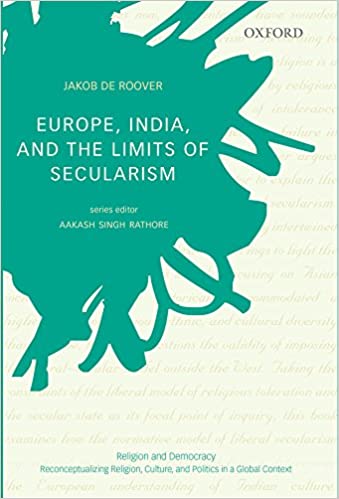
Europe, India, and the Limits of Secularism
Jakob De Roover, 2016
For several decades now, commentators have sounded the alarm about the crisis of secularism. Saving the secular state from political religion, they suggest, is a question of survival for societies characterised by religious diversity. Yet it remains unclear what the crisis is all about. This book argues that its roots are internal to the liberal model of secularism and toleration. Rather than being neutral or non-religious, this is a secularised theological model with deep religious roots.
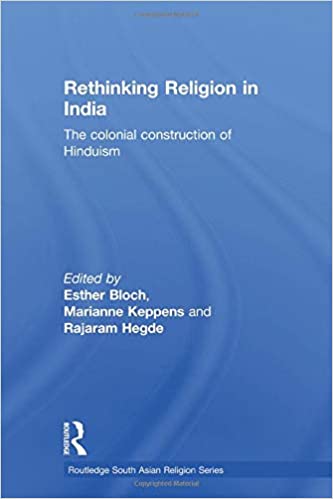
Rethinking Religion in India: The Colonial Construction of Hinduism
Edited by Esther Bloch, Marianne Keppens and Rajaram Hegde, 2010
According to the classical paradigm, Hindu traditions are conceptualised in terms of a religion with distinct beliefs, doctrines, sacred laws and holy texts. Today, however, many academics consider this conception to be a colonial ‘construction’. This book focuses on the different versions, arguments and counter-arguments of the thesis that the Hindu religion is a construct of colonialism. Where some of the contributors argue that Hinduism was created as a result of a western Christian notion of religion and the imperatives of British colonialism, others show that this religion already existed in pre-colonial India; and as an alternative to these standpoints, other writers argue that Hinduism only exists in the European experience and does not correspond to any empirical reality in India.
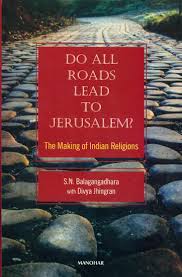
Do All Roads Lead to Jerusalem? The Making of Indian Religions
S. N. Balagangadhara with Divya Jhingran, 2014
Do All Roads Lead to Jerusalem? traces the history of western encounters with other cultures on two occasions – the ‘pagans’ of Greece and Rome and the ‘heathens’ in India. The West has produced many descriptions of other cultures. A close examination of these descriptions reveals that they tell us more about western culture than about the cultures the West has attempted to describe. This over-arching theme is developed by examining one element in western culture, namely, religion. This book argues that religion is not a cultural universal and the belief that all cultures have religion is an assumption on the part of all scholars of religion.
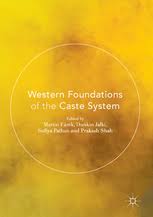
Western Foundations of the Caste system
Edited by Martin Fárek, Dunkin Jalki, Sufiya Pathan, Prakash Shah, 2017
This book argues that the dominant descriptions of the ‘caste system’ are rooted in the Western Christian experience of India. Thus, caste studies tell us more about the West than about India. It further demonstrates the imperative to move beyond this scholarship in order to generate descriptions of Indian social reality.

As Others See Us: A Conversation on Cultural Differences
Divya Jhingran and S.N. Balagangadhara, 2015
At this time, all cultures are studied through the prism of western scholarship. This results in a distortion that denies peoples from other cultures an access to their own experience. An examination of some key ideas drawn from Indian and western culture highlights the nature of the problem and the conceptual constraints imposed by western scholarship. These constraints are so deep and so pervasive within western culture that they set limits on western imagination itself, and, consequently, on the imagination of folks from all other cultures. Now, to regain access to the varieties of cultural experience, we must develop alternative theoretical frameworks. Here is an example of one such attempt. With this, we can begin to get a taste of what the world, including the West, would look like if people from other cultures were to describe it in their terms.
In Kannada
ಸ್ಮೃತಿ–ವಿಸ್ಮೃತಿ : ಭಾರತೀಯ ಸಂಸ್ಕೃತಿ (Remembrance, Amnesia: Indian Culture – Translation of “The Heathen in his Blindness…”)
S.N. Balagangadhara, translated by Rajaram Hegde, 2009
This was the first book from the research programme to be translated into an Indian language. It drew the attention of various types of audiences in Karnataka and won the prestigious Karnataka Sahitya Academy award. Because of the kind of response it received, the book was reprinted in 2017.
ಪೂರ್ವಾವಲೋಕನ (Observing the East/the Past)
S.N. Balagangadhara, translated by Rajaram Hegde and Sadananda Janekere, 2011
This is a collection of translated articles originally written in English by Balagangadhara . This book was one of the most popular Kannada non-fiction books and went out of print within two years of its publication. Both research students and faculty members belonging to the research programme were involved in translating and editing this book.
ಸಂಸ್ಕೃತಿ ಸಂಕಥನ: ನಮಗೆ ನಾವೇ ಪರಕೀಯರು (The Story of a Culture: We are Strangers to Ourselves)
Ainkai Ramananda, 2012
This is a collection of popularising articles that introduce Balagangadhara’s thoughts to common readers. These articles were published as a column in a Kannada daily. There are totally 30 articles dealing with topics like cultural difference, Western categories that dominate in India studies such as religion, secularism, law, caste system, and history, and other themes like itihasa and puranas, sampradayas, adhyatma, etc. The author is a theatre artist and literary figure, who drew upon the research results of the Comparative Science of Cultures research programme, to reflect on ideas concerning happiness, theatre, stories, and many other concerns.
ಬೌದ್ಧಿಕ ದಾಸ್ಯದಲ್ಲಿ ಭಾರತ (India under Intellectual Enslavement)
Rajaram Hegde, 2015
This is the first book of a series called “Vasahatu Prajneya Visvarupa’’ intending to introduce Balagangadhara’s thoughts to Kannada readers. It is a collection of popularising articles. The first part introduces Balagangadhara’s critique of the notion of Hinduism and the connected ideas. The second part outlines his views on a traditional culture and Indian traditions. The third part is on the notion of secularism and Indian politics. The articles are originally written for a daily newspaper “Vijaya Vani”, being received by the readers with great curiosity.
ಬುದ್ಧಿಜೀವಿಗಳ ಮೂಢ ನಂಬಿಕೆಗಳು (Superstitions of Intellectuals)
Rajaram Hegde, 2015
This is the second book in the series “Vasahatu Prajneya Visvarupa’’. This volume includes articles divided into three sections on topics like the caste system, normative ethics, liberal ideas and Indian political practice. Together with the first book, it demonstrates how the most ordinary debates in India today are guided by colonial consciousness, how educated Indians talk about things that they have no understanding of and how these stories deny access to the experience of people. In fact, the attempt was to show the depth and scope of the impact of colonial consciousness on the daily life of ordinary people. Both books have seen two prints which generated a serious debate involving people outside the research programme.
In Czech
Indie očima Evropanů (India through the Eyes of Europeans)
Martin Fárek, 2014
This book looks for answers to several questions, connected by one meta-question: if Christian-theological thought, albeit in an implicit and secularised manner, were to form the basis for European accounts of Indian traditions, Czech Orientalist scholarship will not be fundamentally different from that of Western Europe in this respect. With this goal in mind, the author argues about the problems with explanations of Indian traditions such as Hinduism and Buddhism, about the ideas of the development of Indian religions, about questions pertaining lack or presence of historical consciousness in India, about disputes concerning the Aryan Invasion Theory, and about Rammohan Roy’s understanding religion.